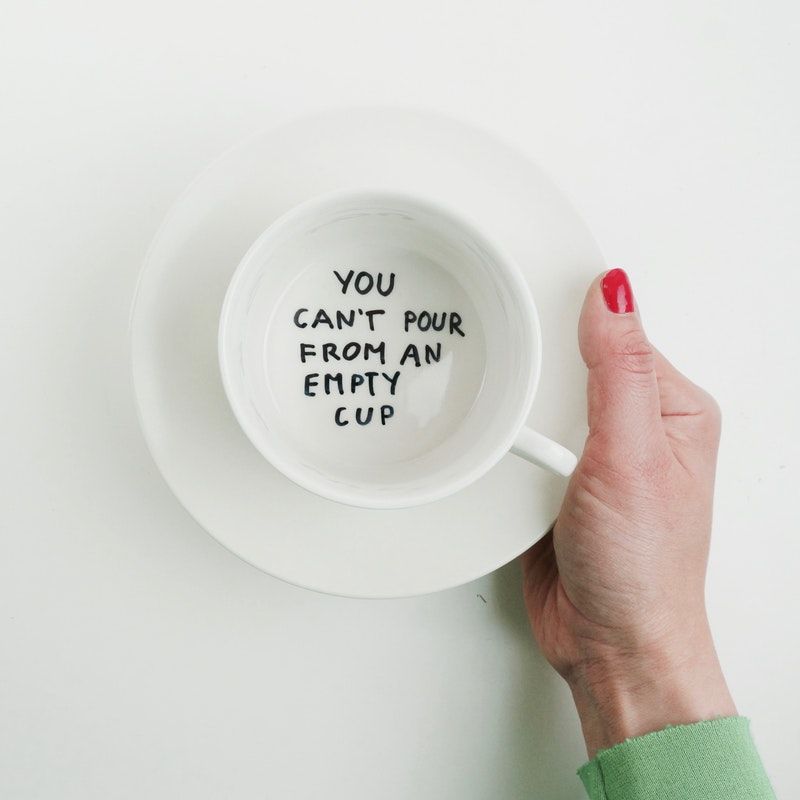I have a poster in every office I work in that states, “You can’t pour from an empty cup”. I’m not sure of the original author but it serves as a reminder to me that as a Psychologist, supporting others each day, I need to ensure I take the time to look after myself, so I can look after others more efficiently.
Within my role, I have the privilege of getting to know parents and carers who take the responsibility of looking after their kids very seriously. Stop and think for just a minute about what you do for your child every single day. You feed them, guide them, talk with them, clothe them, bathe them, entertain them, teach them, protect them, reassure them, read to them, help them with homework, and taxi them around to their hobbies. Most parents need to be reminded that they too are worth focusing on, and that it is okay and actually beneficial to take time to care for yourself.
What is self-care?
An activity that you do to deliberately focus on taking care of your emotional, mental, social, or physical health. Self care is something we enjoy, NOT force ourselves to do, or something that becomes just another thing to tick off the to do list. Self-care doesn’t drain or take away from us but rather reenergizes and replenishes our wellbeing. Importantly, self-care is NOT selfish!
I see you rolling your eyes, and saying, ‘But I haven’t got time for that’, but trust me, you are too busy to not make time for self care!
The 3 S’s of self-care:
- Simplify. Remember self care doesn’t have to be expensive and time intensive. Self-care may be paying attention to what time you go to bed, or pausing to take 3 deep breaths at your computer desk. Find what works for you.
- Say No. Learn to be protective with your time and energy. Say no to the things that don’t serve you, or fit with your values, and say yes to those things that revive and replenish you. It’s ok to say no to the extra shift your boss asks you to take on, and say yes to coffee with a friend on your day off.
- Schedule. I cannot emphasise this enough, when you are starting anything new and different you need to plan and make time for it within your daily routine and life. Write it on the calendar; make arrangements for the kids if needed, schedule it into your life until it becomes your new normal.
Here are a few suggestions, which are by no means an exhaustive list, try choosing two things that you can schedule into your week.
Physical:
- Eat regular, nutritious, balanced meals.
- Get enough sleep.
- Find a form of exercise you enjoy
- Take time away from the TV, phone, emails, etc.
- Spend time outside in the natural light and fresh air.
- Don’t put off getting medical attention (GP, dentist, physio, psychologist, etc.).
- Book in for a massage.
Emotional/Social/Psychological:
- Book a date with your partner.
- Re-read, or re-watch favourite books or movies.
- Identify comforting or enjoyable activities, objects, people, or places, and seek them out.
- Spend time connecting with friends and family.
- Give yourself permission to express your emotions, allowing yourself to cry and finding things that make you happy.
- Practice mindfulness in everyday life.
- Allow curiosity.
- Say no to extra responsibilities.
Creative/Spiritual:
- Give yourself quiet time for self-reflection.
- Attend a local place of worship, connect with your spiritual community.
- Write in a journal, draw, or paint.
- Be open to inspiration.
- Spending time out in nature.
- Try something new, or reconnect with an old hobby.
What happens when self care is overlooked?
Good self care practices can lead to healthy physical and mental wellbeing, however when self-care is neglected, it can lead to stress in the mind and body. Stress can impact us physically, with high blood pressure, weakened immune system, and difficulty sleeping, as well as mentally, with increased irritability, poor concentration, with prolonged high stress leading to anxiety, or depression.
In addition, for parents, it is even more crucial to practice self-care. Little ones learn from example and are always looking to you as role models. In other words, when your kids see you prioritising steps to healthy habits and relationships, and having fun in life, you are teaching them how to respect and care for themselves as they grow and develop into adults.
Furthermore, when self-care isn’t practiced, parenting can become even more challenging than it already is. It takes effort to be a patient, energetic, and calm parent, and this is hard when we are not looking after our physical and mental wellbeing. When we get stressed, irritable, and overwhelmed, it can lead to reactive parenting approaches, yelling, and missing opportunities to encourage positive behaviours.
So, don’t look at prioritising self-care as something that takes away from your children, but rather practicing your own self-care can actually lead to improved ability to care for your children. Just like the quote in my office, you need to fill your cup first, so that you have more (or something) to pour into your children.
